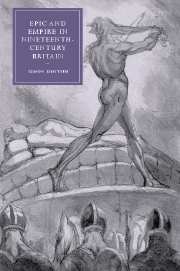Book contents
- Frontmatter
- Contents
- Acknowledgements
- Introduction
- 1 Homer, Ossian and Modernity
- 2 Walter Scott and Heroic Minstrelsy
- 3 Epic Translation and the National Ballad Metre
- 4 The Matter of Britain and the Search for a National Epic
- 5 ‘As Flat as Fleet Street’: Elizabeth Barrett Browning, Matthew Arnold and George Eliot on Epic and Modernity
- 6 Mapping Epic and Novel
- 7 Epic and the Imperial Theme
- 8 Kipling, Bard of Empire
- 9 Epic and the Subject Peoples of Empire
- 10 Coda: Some Homeric Futures
- Notes
- Bibliography
- Index
- CAMBRIDGE STUDIES IN NINETEENTH-CENTURY LITERATURE AND CULTURE
8 - Kipling, Bard of Empire
Published online by Cambridge University Press: 22 September 2009
- Frontmatter
- Contents
- Acknowledgements
- Introduction
- 1 Homer, Ossian and Modernity
- 2 Walter Scott and Heroic Minstrelsy
- 3 Epic Translation and the National Ballad Metre
- 4 The Matter of Britain and the Search for a National Epic
- 5 ‘As Flat as Fleet Street’: Elizabeth Barrett Browning, Matthew Arnold and George Eliot on Epic and Modernity
- 6 Mapping Epic and Novel
- 7 Epic and the Imperial Theme
- 8 Kipling, Bard of Empire
- 9 Epic and the Subject Peoples of Empire
- 10 Coda: Some Homeric Futures
- Notes
- Bibliography
- Index
- CAMBRIDGE STUDIES IN NINETEENTH-CENTURY LITERATURE AND CULTURE
Summary
KIPLING THE MODERN BARD
The notion of Kipling as the ‘bard of empire’ is now such a cliché as scarcely to invite commentary. I hope that the preceding chapters will have alerted readers to the realisation that behind the familiar phrase lies a submerged problematic, that of epic primitivism, which emerges into partial view in the contemporary reception of Kipling's poetry, in its subsequent criticism and indeed in Kipling's own conception of himself as a poet. This chapter explores the implications of a bardic notion of poetry at the end of the nineteenth century, when the empire in question was in no sense equivalent to the empire sought by Agamemnon and very different also to that sought by Aeneas. Marx's questions, with which I began this book, asked, ‘Is Achilles possible with powder and lead? Or the Iliad with the printing press, not to mention the printing machine? Do not the song and the saga and the muse necessarily come to an end with the printer's bar, hence do not the necessary conditions for epic poetry vanish?’ Kipling's poetry, if genuinely bardic, would seem to suggest that the ‘song and the saga and the muse’ could indeed co-exist with the printing machine – could indeed thrive only on condition that the printing press provided it with publicity. If Kipling in any sense wrote epic poetry, it was under conditions of modernity that radically transposed both its form and its content.
- Type
- Chapter
- Information
- Epic and Empire in Nineteenth-Century Britain , pp. 150 - 174Publisher: Cambridge University PressPrint publication year: 2006



